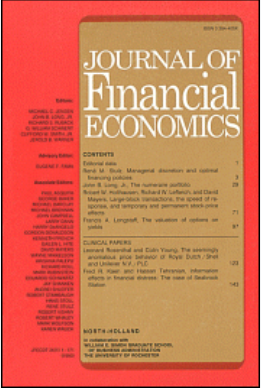Four facts about ESG beliefs and investor portfolios
IF 10.4
1区 经济学
Q1 BUSINESS, FINANCE
引用次数: 0
Abstract
We analyze survey data on ESG beliefs and preferences in a large panel of retail investors linked to administrative data on their investment portfolios. The survey elicits investors’ expectations of long-term ESG equity returns and asks about their motivations, if any, to invest in ESG assets. We document four facts. First, investors generally expected ESG investments to underperform the market. Between mid-2021 and late-2023, the average expected 10-year annualized return of ESG investments relative to the overall stock market was 2.1%. Second, there is substantial heterogeneity across investors in their ESG return expectations and their motives for ESG investing: 48% of survey respondents do not see any reason to invest in ESG, 24% are primarily motivated by ethical considerations, 22% are driven by climate hedging motives, and 6% are motivated by return expectations. Third, there is a strong link between individuals’ reported ESG investment motives and their actual investment behaviors, with the highest ESG portfolio holdings among individuals who report ethics-driven investment motives. Fourth, financial considerations matter independently of other investment motives: we find meaningful ESG holdings only for investors who expect these investments to outperform the market, even among those investors who reported that their most important ESG investment motives were ethical or hedging reasons.
关于ESG信念和投资者投资组合的四个事实
我们分析了一大批散户投资者对ESG信念和偏好的调查数据,这些数据与他们投资组合中的行政数据有关。该调查引出了投资者对ESG股票长期回报的预期,并询问了他们投资ESG资产的动机(如果有的话)。我们记录了四个事实。首先,投资者普遍预期ESG投资的表现将落后于市场。从2021年年中到2023年底,ESG投资相对于整体股市的10年平均预期年化回报率为- 2.1%。其次,投资者的ESG回报预期和ESG投资动机存在很大的异质性:48%的受访者认为没有任何理由投资ESG, 24%的受访者主要出于道德考虑,22%的受访者出于气候对冲动机,6%的受访者出于回报预期。第三,个人报告的ESG投资动机与其实际投资行为之间存在密切联系,在报告道德驱动的投资动机的个人中,ESG投资组合持有量最高。第四,财务考虑独立于其他投资动机:我们发现,只有那些期望这些投资表现优于市场的投资者,才会持有有意义的ESG,即使是那些报告称其最重要的ESG投资动机是道德或对冲原因的投资者。
本文章由计算机程序翻译,如有差异,请以英文原文为准。
求助全文
约1分钟内获得全文
求助全文
来源期刊

Journal of Financial Economics
Multiple-
CiteScore
15.80
自引率
4.50%
发文量
192
审稿时长
37 days
期刊介绍:
The Journal of Financial Economics provides a specialized forum for the publication of research in the area of financial economics and the theory of the firm, placing primary emphasis on the highest quality analytical, empirical, and clinical contributions in the following major areas: capital markets, financial institutions, corporate finance, corporate governance, and the economics of organizations.
 求助内容:
求助内容: 应助结果提醒方式:
应助结果提醒方式:


